- Home
- Brian Falkner
Ice War Page 2
Ice War Read online
Page 2
“When do the Angels go in?” she asked.
“They’re already on their way,” he said.
ABOVE THE ICE
[MISSION DAY 1, FEBRUARY 16, 2033. 1025 HOURS LOCAL TIME]
[BERING STRAIT, SOUTH-WEST OF LITTLE DIOMEDE ISLAND]
The cold was startling, even through the armoured, thermally heated combat suit. Part of that was the adjustment period, Price knew, as the thermals sensed the rapid temperature drop and slowly warmed to compensate. Part of it was psychological. Just looking around at this desert of sea ice; feeling the spray of ice particles that clattered against the suit; hearing the low throbbing moan of the arctic wind: it was enough to cause an involuntary shiver no matter what the temperature inside the suit.
Price’s leg itched. The new one. Grown for her by human scientists using Bzadian technology. According to Monster, she was part Bzadian now, and no amount of arguing that it was her own cells they had cloned would convince him otherwise.
Or maybe he just liked to tease.
It was not long after dawn. At this time of year, in this part of the world, the sun could not be bothered making an entrance until well after ten in the morning. It would hover tiredly above the horizon for a paltry eight hours then sink, as if exhausted, below the ice.
That gave them only a few hours to reach their mission objective. It was too dangerous to move out on the icefloes in the darkness, even with night-vision goggles. And overnight the temperature dropped to even more dangerous lows.
“Com check,” she said. She watched the fin of the submarine disappear down the hole in the ice as the five other Angels sounded off, two to six. Two was Sergeant Panyoczki: Monster. She was glad he was here, and not only for his soldiering skills. He was someone she trusted, absolutely, without question. But more than that. He was someone she cared deeply about. Whatever they faced out here, they would face it together.
It had taken the submarine over four hours to find the lead – a fracture between two floes, where the water had not had time to refreeze and was covered by only a thin crust.
The winter ice in the turbulent Bering Strait has a life and a geography all of its own, due to the constant buffeting of the currents that run through the narrow passage between Russia and Alaska, bringing with them the outflow of sea ice from the Arctic Ocean. Great floes collide with each other, erupting into ridges and hummocks, piggybacking on top of each other to create rafted floes. All of this constantly scoured by the wind-born ice.
For years the great Bering Strait currents had prevented the strait from freezing, but a relatively recent, and inexplicable, change in the local climate had led to the accumulation of more and more sea ice, “drift ice” latching onto land-fixed “fast ice” and gradually spreading until a bridge of ice connected the two continents, with the Diomede Islands, Big and Little, at its centre.
The submarine had located numerous leads in the ice canopy above, but most were too small, unstable, or in the wrong location.
Once this lead had been found, the submarine had surfaced at speed, using the top of its fin as a battering ram to smash its way through three or four centimetres of ice.
The submarine was gone now and Price sensed, rather than saw, its grey bulk slip away beneath the ice. On the surface of the water, delicate petals of frost flowers were already starting to form. Pretty, fractal shapes, like miniature white ferns, spreading and branching off, again and again.
Within minutes, the water would wear a white coat of frost, and within the hour it would be strong enough to walk on.
“Oscar Mike in five mikes,” Price said. “Check your battery levels.”
Batteries could behave strangely in these temperatures, and a dead or low battery meant no thermals, and that meant death in this bitter and frigid world. They each carried a spare battery for that reason, and there were more on the equipment sled.
“Rope up,” Monster said.
The ropes were lightweight nylon cords, thin but immensely strong. They had to be.
“We’re sheltered here,” Price said, clipping hers on and checking that it was secured properly. “You’d better prepare yourselves for what we’re going to hit once we get out of this lead.”
“I can hardly wait,” The Tsar said. He smiled his confident, charming smile. Another good addition to the team. He had proved that on Operation Magnum. He was still a bit cocky and full of himself, but that had diminished as he had got to know them better.
PFC Emile Attaya was the next in line, standing in front of Price, who double-checked the karabiner clips at his end. Emile was a good-looking Lebanese kid who smiled constantly and seemed to burn energy the way other people breathed air. Having Emile around was like having a new puppy in the house and although it went against protocol, nobody, not even the commanders back at Fort Carson, called him by his surname. He was always just “Emile”. Like Monster, English was not his first language. But unlike Monster, he spoke it well, with merely a trace of an accent.
“We should have brought parasails,” Emile said. “We could have used the wind and sailed there.”
“If it was blowing in the right direction,” Wall said. “Which it’s not.”
Specialist Hayden Wall. The other new Angel. He talked constantly and was usually moaning about something. He did it with the broad “A” and missing “R” of the native New Englander. His dour moping was a complete contrast from Emile’s infectious enthusiasm and quick smile.
“Or bobsleds,” Emile said. “We could have had dogs to pull us along.”
“Somebody find his off button,” Barnard said, but she smiled as she said it. Even cynical, sarcastic Barnard was not immune to Emile’s puppy dog charm.
Price took an ice-axe from the equipment sled and slipped the loop over her wrist. The others followed suit.
She watched each of them, thinking about the faith they were putting in her as leader of the mission. She hoped it wasn’t misplaced.
She shouldn’t even be here. With a new leg and the intense trauma, both physical and psychological, of the disastrous Operation Magnum, nobody would have blamed her for turning down the mission. But she had said yes, and told anyone who asked that it was because she didn’t feel her fight was finished, that she didn’t want to let down her comrades, that she felt she had something to offer. She had a thousand reasons.
But the truth was that six months lying in a hospital bed plus another six months of rehab had bored her senseless. Fort Carson too had bored her with its regimented mealtimes and mindless routines. She needed the buzz: the thrill, the coil-gun jumping in her arms, adrenaline coursing through her body. Sometimes it seemed she only felt alive when she was in imminent danger of death. But she couldn’t tell that to anyone. Not even Monster. If the counsellors back at Carson heard her say that, they would never let her out of their sight.
Someday the war would be over, one way or another, and she would have to deal with it. But that day was a long way off, and by then she might not even be alive to worry about it.
“Weapons check,” she said. She checked her own, hitting the release that sprang the coil-gun over her shoulder and into her arms. “Okay, Angels. Listen up. You are probably wondering what we are doing here.”
“Yeah, bro,” Wall said. “I am wondering why I am freezing my ass off in the middle of nowhere when there are warm bunks and hot pizza back at base.” He seemed to be having a problem with his weapon release.
“Don’t worry about it, Wall,” The Tsar said, moving over to give Wall a hand. “It’s just typical ACOG. They send us out on these missions but everything is so top secret that we don’t know whether we’re wiping our ass or blowing our nose until we see the colour of the tissue.”
“And I don’t care how warm the bunks are at Fort Carson,” Barnard said. “I’d rather be out here doing something than sitting around doing nothing.”
She wasn’t the only one, Price thought.
“Okay,” Price said. “This is a straightforward reconnaissance
mission. We are to avoid contact. In any case, ACOG tells us there’s no enemy activity within fifty klicks.”
“Except for a million Pukes lined up on the Chuchki shore, waiting to have a go at us,” Wall muttered.
“That’s the point, Wall,” Barnard said. “They’re fifty klicks away. They’re not here.”
The Tsar stepped back so Wall could test his gun again. It released without problem, jumping straight into his hands. He tried it three or four times to be sure.
“Little Diomede Island is packed with so many sensors that they can hear a snowflake freeze,” Price said. “And those sensors tell us that the Pukes are still sitting on their backsides over in Russia. All we have to do is stroll over to the island, set eyes on the control station, observe and report.”
“Report on what?” The Tsar asked.
“There are two operators on that station,” Price said. “Specialist Gabrielle Bowden and Specialist Nicholas Able. We need to know that they’re both okay, and that everything is as it should be.”
“Maybe we should have just phoned and asked them,” Wall said.
Price ignored him. “Once ACOG are satisfied that everything is aboveboard, we get the hell out, as quickly as we can.”
“And if we run into any real Pukes?” Wall asked.
“Then we’ll waste them all,” Emile said. “Bring it on.”
“He’s kinda cute,” Barnard said. “Reminds me of Wilton.”
“Emile, our orders are to avoid engagement,” Price said. “Don’t go all Chuck Norris on me.”
“Gonna be a walk in the park,” The Tsar said.
“Some park,” Wall said. “Where’s the grass, the lake and the pigeons?”
“I think this place is awesome!” Emile said, gesturing around at the translucent blue and white of the walls of the lead.
“All right, Angels. We are Oscar Mike,” Price said.
“Checking your ropes, my dudes, and maintain each two-metre separations,” Monster said.
Price hid a smile. For more than two years now she had worked with Monster. His Bzadian was flawless, but he still couldn’t speak English worth a damn.
Price had warned them the wind would get worse when they got higher, but even she wasn’t prepared for the furious gust that hit them as they emerged from the shelter of the lead. They crouched, heads into the wind, and dug their axes deeply into the ice.
“Boo-yah, my first real mission,” Emile squawked on the com.
“No, it’s not,” Price said. “We’re not officially here. The Angels have been stood down, remember? This mission doesn’t exist.”
“At least we get real bullets,” The Tsar said. “Not like Magnum when we only had puffer rounds.”
“Puffers would do no good here,” Barnard said.
She was right. The compacted powder of a puffer round exploded into a cloud when it hit body armour. The target breathed it in and was unconscious within seconds. But puffers were useless against an enemy wearing full-face masks – a necessity in this frigid air.
“Move ’em out, Angels,” Price called after the worst of the squall subsided.
The Tsar was on point. He stood and began to move, leaning almost horizontally into the wind. Price kept an eye on Wall and Emile. They were unknown quantities. They had the best scores of all the trainee Angels, but that meant nothing when you got into the field.
Wall, in particular, had only one year of training, but his skill with a rifle rivalled that of the legendary Blake Wilton. Even so, Wall was only on the mission because two more experienced Angels had been injured in training and one had mysteriously disappeared from Fort Carson.
Price’s leg itched again, left side, just below the knee.
Some of the ridges and hummocks they climbed, some they avoided. The flat areas at the centre of floes were the easiest, but they were also where the wind was strongest.
Already, Price was starting to wonder if the two missing Seal teams had simply fallen through gaps in the ice. That would explain the screams and the sudden loss of radio contact. But it wouldn’t explain Legrand, the station commander who had died in mysterious circumstances.
“We could walk past a Puke patrol in this weather and never even see them,” The Tsar said.
“We’re not likely to run into any Pukes here,” Barnard said. “We are south of the islands. The direct route between Russia and Alaska is to the north. This route would be much longer and the ice here is too rough for tanks.”
“Why is that?” The Tsar asked.
“There’s more movement in the icefloes,” Barnard said. “Because it’s warmer here than up north.”
“Yeah, bro, this is real toasty,” Wall said.
“Anything else to complain about, Wall?” Barnard asked. “Don’t hold back; let’s get it all out there.”
“Well, now that you mention it,” Wall said, “I can’t understand why they’re making us walk. Haven’t they heard of snowmobiles?”
“Or how about a chauffeur-driven limousine?” Barnard said. “Take you right up to the front door and lay out the red carpet for you.”
“I was just saying,” Wall said. “This is the thirties, not the sixteenth century.”
“Snowmobiles make noise and heat,” The Tsar said. “You want to advertise that we are coming?”
“Why not?” Wall asked. “The LT said there are no Pukes for fifty klicks.”
“Wall,” Monster said.
“Yeah?”
“Keep mouth shut.”
“Amen to that,” The Tsar said.
They passed an upside down V made from two giant slabs of ice, both oddly straight and rectangular-shaped. Not long after that a narrow track dropped into a deep gully – a huge scar between two floes that had iced over and was gradually healing. Here the walls protected them from the wind and the flying snow. That continued for over a hundred metres before they emerged onto a flat sheet of ice where the going was smooth, although the wind was cruel.
Some time after that, Price realised the ground beneath her feet was vibrating. At first she thought it was the wind, or the judder of the equipment sled over the rough ice, but it quickly became clear that the ice itself was moving. The vibration rapidly progressed to a shaking that made it difficult to walk, then a sudden sideways lurch in the ice beneath their feet threw them all to the ground.
Price started to get up, but Monster called, “Wait.”
There was another jerk and another. For a few minutes the ice went crazy, shaking like an earthquake.
As harsh as it had been, at least the Australian desert was steady under your feet, Price thought, embedding her axe in the ice and gripping it tightly. On Operation Magnum they had been on T-boards or motorbikes most of the way. On this mission it seemed the enemy would be the least of their problems.
“What’s going on?” The Tsar asked.
“Ice quake,” Barnard said. “It’s not a glacier we’re on; it’s a sea. A bunch of icefloes all bumping and scraping against each other.”
“That nothing,” Monster said. “Will get much worse.”
“Okay, everybody, just relax. Stay where you are,” Price said. “We’ll be Oscar Mike again as soon as we are sure this has settled down.”
The flat plain took them to a ridge that stretched as far as they could see in either direction. Two icefloes had rammed into each other and the compressed ice had pushed up, forming the sail of the ridge, and down, forming the keel. It was not a smooth shape, but a rough jumble of ice pieces. There was no alternative but to climb it.
The equipment sled was going to be the biggest problem. It would have to be carried. That meant un-roping.
Monster took the back end by himself. Price and The Tsar were about to take one front runner each when Wall stepped in. “I’ll take it, bro,” he said to Price.
She stepped back, grateful. The rehab had been intense, but she still didn’t feel as strong as before. Monster said it was just confidence, and maybe he was right, but either way
she was happy not to put her new leg and her rehabbed muscles to such an arduous test.
Wall was surprisingly strong, she saw. Not bulky like Monster, but a sinewy strength. He trudged steadily up over the hummock. He didn’t appear to notice or mind the lashing of the wind.
Monster, carrying the entire back end by himself, seemed happy enough, and somehow they got the sled to the top. They stopped there briefly before beginning the climb down the other side, resting the sled often as they found their footing.
At the base of the ridge, they set off again across smooth clear ice that was like glass beneath their feet.
A brief lull in the storm revealed two dark shapes in the distance, one huge, the other glowing with artificial light.
The glowing shape was their destination. Little Diomede. Ice-covered and climbing up out of the sea of white, it was the peak of an underwater mountain. It dominated the area, along with its larger brother, Big Diomede.
The wind came back up and with it great flurries of snow and ice. The islands disappeared as if they had been no more than a mirage. The conditions were approaching white-out, and Price knew they would have to stop soon. It would be too dangerous to continue, a fact that became very obvious when The Tsar stumbled, yelling, his arms windmilling. Monster reacted quickly, yanking on the rope. Price was jerked backwards and sat down on her backside, hard. So did Wall, in front of her, and it rippled up the line to The Tsar.
When Price crept forwards to see, he was sitting with his legs dangling over the edge of a crevasse.
It was wide, at least four metres across. If not for Monster, then The Tsar might have plunged straight in, pulling the rest of them after him. The mission could be over in a second, and no one would ever know their fate. Maybe the mystery of the missing Seals really was as simple as that.
At the bottom of the crevasse, nearly two metres down, was a dark river of ocean. The crevasse was new, probably formed in the recent ice quake.
“Okay, Monster,” Price said. “How do we get across?”
Monster had served alongside their last lieutenant, Ryan Chisnall, in the Great Ice War of 2028. He was the only Angel with arctic experience.

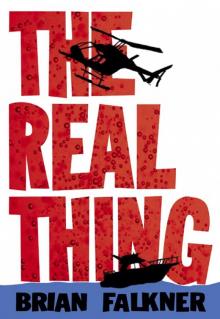 The Real Thing
The Real Thing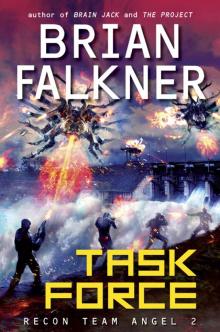 Task Force
Task Force The Flea Thing
The Flea Thing The Project
The Project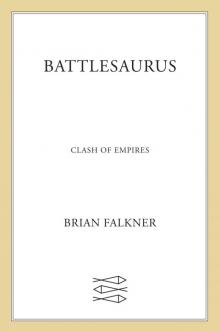 Clash of Empires
Clash of Empires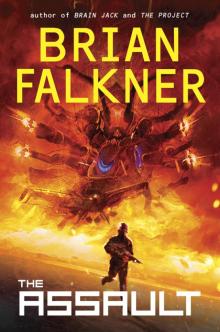 The Assault
The Assault Brain Jack
Brain Jack The Tomorrow Code
The Tomorrow Code Vengeance
Vengeance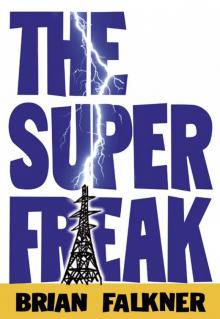 The Super Freak
The Super Freak Northwood
Northwood Cave Dogs (Pachacuta Book 1)
Cave Dogs (Pachacuta Book 1) Maddy West and the Tongue Taker
Maddy West and the Tongue Taker